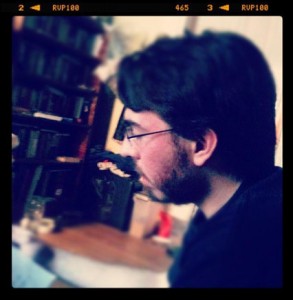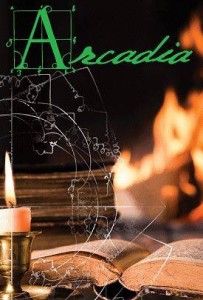Michael Fisher concludes his multi-part review experiment of ARCADIA at the Lantern Theater Company. Michael saw Tom Stoppard’s complex play three times over several weeks and gave his thoughts after each performance. Through this experiment he hoped to craft a more thorough, unrushed form of criticism. So what did he learn? How do we consider a production differently when it seen several times in the middle of a run? Was this experiment a success? Find out below.

(1) There’s too much noise. There’s too much bloody noise.
In Tom Stoppard’s ARCADIA—which finishes up an extended run at Lantern Theater Company this Sunday—“noise” is the term applied to disruptions within a closed system. Chaos. Entropy. The irritants of the physical world that throw us off-course. In the play, Valentine (Daniel Frederick) complains that the “noise” coming from the outside world causes constant disruption in his attempts at gathering data. Sure, all systems tend to obey a pattern if you observe them close enough. But even then, it’s very noisy out there.
(2) If necessity is the mother of invention, what was the need that inspired the inception of arts criticism? Was there a burning desire to rate works, to judge them according to a predetermined set of (probably arbitrary) standards? Was there an urgent need to understand art, leading to an uncontrollable compulsion to verbalize its effects on us? Are those compulsions and their resultant conclusions relevant to anyone other than the critic him/herself?

(3) I saw ARCADIA three times in an effort to craft a more thorough criticism, the idea being that you can’t get a fully-formed understanding of a work of art from a single viewing—and you certainly can’t articulate such an understanding in a six hundred word review written on the train ride home. The thing about ARCADIA—and about Lantern’s production—is that it makes this task both much easier and much more difficult than sounds on paper.
Perhaps I played it too safe by choosing for this experiment a play I was pretty sure I’d enjoy. I like Stoppard. I like talky plays full of heady concepts. Generally, I like Lantern. I was predisposed to have a positive opinion of the production and to be able to put up with it for three full performances. If I’d been asked to conduct this experiment with an untested company staging a Christopher Durang play, I might have just shot myself to avoid the task altogether. But from a critical standpoint, it might have been a greater challenge. ARCADIA is a play that has been talked about and analyzed for twenty years, and it will continue to be talked about and analyzed for centuries (or as long as live theater lasts, but that’s a whole other #thinkpiece). It has no want for big things to think and write about. I could see it fifty times and write fifty reviews and I’d still be nowhere near the bottom of it.
So my challenge with ARCADIA is threefold: First: How can I possibly say something original about this play? Second: How can I possibly communicate all the thoughts it has provoked in me? Third, and perhaps most importantly: How can I be sure that I’m doing justice to the production as well as the play itself?
(1A) There’s a lot of noise when it comes to writing criticism. Maybe you had a bad day so you take it out on the work you’re reviewing. Maybe one of the actors looks like that kid who put gum in your hair in the third grade. Maybe the person sitting in front of you at the theater has an eighteen-inch stovepipe hat and a hideous, distracting laugh. The person absorbing the show, then, is not you, but a sleepy, surly, irritated version of you that doesn’t really like anything at the moment. (This can also work the opposite way; I often suspected that Roger Ebert developed a higher inclination toward favorable reviews as his health deteriorated, and I wondered if his kind words were a manifestation of his relief at simply waking up each morning.)
This outside noise seeps into the review, and there’s nothing you can do about it.
The noise that I struggle with each time I set out to write a review concerns the limits of my own intellect. I wrote in earlier parts of this experiment about my distaste for the use of abstract modifiers as a substitute for detailed, in-depth criticism. Paradoxically, I found that writing scores of words about the specifics of each performance took way too long and, in the end, was probably a less-than-excellent substitute for saying, “Maxwell Eddy was very good as Septimus.” (Actually, I didn’t even get to Maxwell Eddy in the course of my writing, which shows you just how bloody difficult this business can be. I assure you, he’s very good as Septimus.) The sweet spot, then, must be located somewhere between these two extremes. But the noise of my intellectual simplicity throws up a screen between me and that elusive sweet spot, and I have no idea how to break through it.
(2A) The term “art criticism” was coined in 1719 by a painter called Jonathan Richardson. He created an objective scale for judging art, similar to the method used by those stodgy old professors in Dead Poets Society who measured the greatness of a given poem by graphing its metric properties. Basically, Richardson broke a painting down into categories concerning its concrete elements (composition, coloring, etc.), assigned a numerical score to each category, and then added the scores together to determine the painting’s overall worth. The benefit of this rubric, according to Richardson, was that anybody could understand it and use it to judge any painting. (Richardson may indeed be the accidental begetter of the familiar trope, “Everyone’s a critic.”)
Not exactly a romantic’s idea of determining artistic merit, but we had to start somewhere. At some point between Richardson’s time and today, we decided that the value of art cannot be measured objectively, that it’s a matter of the emotional response prompted in the individual audience member rather than of cold mathematics.
We were right to do so. In most cases, at least.
 (1B) Another bit of noise that plagues me as a critic (and anyone who’s read my stuff on this site can attest to this) is my tendency to overwrite. This is more a product of nurture than of nature. I like reading long-form criticism. I like reviews that read like essays—reviews that dive deep into the material, plunging past what the work is and looking at what it means, in contexts philosophical, psychological, and cultural. In order to write this way, I often search, like ARCADIA’s Bernard Nightingale, for outside connections to serve my thesis, whether or not those connections make sense or even exist.
(1B) Another bit of noise that plagues me as a critic (and anyone who’s read my stuff on this site can attest to this) is my tendency to overwrite. This is more a product of nurture than of nature. I like reading long-form criticism. I like reviews that read like essays—reviews that dive deep into the material, plunging past what the work is and looking at what it means, in contexts philosophical, psychological, and cultural. In order to write this way, I often search, like ARCADIA’s Bernard Nightingale, for outside connections to serve my thesis, whether or not those connections make sense or even exist.
For instance, around the time I saw Lantern’s ARCADIA for the first time, I watched the movie Room 237. It’s a documentary delving into the alternate meanings that certain dangerously insane human beings think they have found in Stanley Kubrick’s The Shining. These screwball theories range from “laughable” to “laughable, but kind of interesting,” but what they all have in common is a total disregard for the actual plot and thematic content of the movie. These viewers see images that spark connections in their minds, and so they twist all the visual mechanics of the movie to suit their crackpot readings.
Isn’t that exactly what ARCADIA’s Nightingale does with his ridiculous Lord Byron theory? Isn’t he just trying to bend the narrative of history toward a reading that resembles the story he’s cooked up in his head? Isn’t it strange and disturbing and hilarious that his entire self-worth seems to rest on his half-baked theory being true?
(3A) I could write, and even thought about writing, a lengthy bit of quasi-criticism designed to compare and connect The Shining and Room 237 and Arcadia, elucidating the meanings of those connections and cranking out 1,500 words in the process. (I was also going to shoehorn The Crying of Lot 49 in there somehow, but I’ve forgotten what I was even thinking there.) But such a reading—apart from the fact that it would read like a high school term paper—would have more to do with the text of ARCADIA than with Lantern’s production. And that would be fine if I’d only seen the play once and my impressions of both the play and the production happened simultaneously and in a vacuum. But we’re not in a vacuum anymore.
(2B) So here’s my question: Does a staged production of an established play function as art in the same way that the text itself does? Well, it does and it doesn’t.
There are a number of ways to direct and stage a play, but for our purposes (and leaving aside devised and improvised theater) the realm of interpretation can be whittled down to three categories:
- Traditional (maintaining the intended time period, setting, and themes of the original play)
- Interpretive (changing time periods, swapping character genders, altering the themes of the original play; faithful readers will know that I hate, hate, hate this)
- Minimal (keeping the play’s themes and dialogue, but not too concerned with costumes and sets that would authenticate period and place)
This covers most repertory theater one is likely to see in a lifetime. There is an art to each one, though an objective observer would likely argue that the Interpretive category demands the most raw creativity from directors, while the Traditional category requires the least. Sort of true, but sort of tricky. The reason I hate, hate, hate most productions of the Interpretive variety is because Interpretive directors refuse to trust their source material to carry its own weight. Maddeningly, this method is typically applied to plays that are already great on their own, which is sort of like telling the prettiest girl at the party that she needs a makeover. There is an art to it, sure, but it has more to do with keeping the new interpretation truthful than with coming up with a rad new reading of A Streetcar Named Desire as a space opera.
 (1C) Stephen King never liked Kubrick’s film version of The Shining, claiming that it suppressed his intended themes and made Jack Torrance’s madness too obvious. This is why we know the film version as “Stanley Kubrick’s The Shining” rather than “Stephen King’s The Shining: The Movie.” We wonder whether Kubrick wanted to film King’s book, or whether he wanted to make an entirely different movie and merely used King’s rising literary star as a way to get funding and sell tickets.
(1C) Stephen King never liked Kubrick’s film version of The Shining, claiming that it suppressed his intended themes and made Jack Torrance’s madness too obvious. This is why we know the film version as “Stanley Kubrick’s The Shining” rather than “Stephen King’s The Shining: The Movie.” We wonder whether Kubrick wanted to film King’s book, or whether he wanted to make an entirely different movie and merely used King’s rising literary star as a way to get funding and sell tickets.
(3B) Lantern’s ARCADIA is a Traditional interpretation, and now that I know the play I doubt it could be done any other way. There is an art to staging ARCADIA as it was written, but it’s a subtle art that requires the director to lovingly embrace the text and its many, many themes, rather than projecting a specified reading onto the stage. It’s an art that demands restraint over indulgence. It’s about showing us Tom Stoppard’s ARCADIA rather than [name of director]’s ARCADIA.
Director Kathryn MacMillan has a touching reverence for ARCADIA. Even if the show had been poor (it isn’t) I’d have been able to tell as much from hearing her talk about the play, in post-show talkbacks and pre-show lectures. She views the material with curiosity and fascination, and the production reflects her appreciation for ARCADIA’s incredible depth. She lets the play speak for itself; the lengthy speeches and lectures are not muddled up with stage business or mood music or any such distractions or interruptions, the way a less patient director might have done with such dry material. MacMillan’s art is in pushing her own ego aside so that the art of the play can breathe. It bears her stamp by refusing to bear any stamp at all.
(2C) So: a Traditional interpretation of an established play functions as art only insofar as it exists to present, unfiltered, the art of the play itself. That doesn’t sound like a compliment, but it is.
We might not have much use for Jonathan Richardson’s objective score chart when we look at art these days, but I think we can employ a similar tactic to examine productions. (This assumes, of course, that we take the production to simply be a vessel for the play, which is the true piece of “art” being communicated.) We might rate how well the director appreciated the themes of the text, how reverent the actors were of the play and of each other, whether any ancillary elements distracted from the dialogue, whether the technical aspects seemed intent on drawing attention to themselves, etc. We can’t use math to measure art, but we can use some degree of objectivity to determine whether or not a production did its job as a vessel for the play.
If we were to do this, I have no doubt that Lantern would receive a perfect score for this production. As I wrote in the first part of this experiment, the production is not “brilliant”; the play is brilliant. The production’s value lies in the degree to which it communicates the brilliance of the play, and in that sense it’s not brilliant but just correct.
Which makes it kind of brilliant.
(3C) I’ve danced around it for long enough: Was the experiment a success?
I don’t know.
Here’s what I can say: each time I saw ARCADIA, new realizations and observations came to the surface, as we hypothesized when we came up with this experiment. It was great fun to make these discoveries and to write about them. The experience might cause me to look at productions differently in the future; I might try to imagine what the artists behind the production were thinking about rather than focusing strictly on the end result—although ARCADIA made that pretty easy, since the end result was excellent. I still doubt that a less challenging play would yield as valuable an experience as this one has, but that wasn’t really point. The point was to take the critic’s typical experience and complicate it so that the snap judgments we often see in reviews would be impossible. Even with all the noise involved, I think that’s valuable.
- The introduction to Michael Fisher’s critical experiment
- Part 1 of this multi-part review experiment
- And part 2.
- And part 3
- Read Christopher Munden’s review of the opening night performance of ARCADIA.
- Phindie writer Kathryn Osenlund’s review for CurtainUp.
